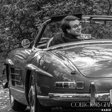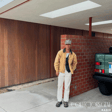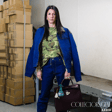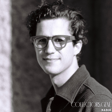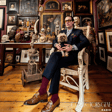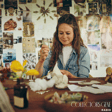The Hidden Treasures of Life
00:00:00
Speaker
when I give up on the hunt, then the thing appears. So the hunt has never really served me very well. I feel like if I if i try not to hunt for things, they they find themselves to me in a much easier way than if I'm looking sometimes.
Welcome to Collector's Gene Radio
00:00:15
Speaker
What's going on, everybody? And welcome to Collector's Gene Radio. This is all about diving into the nuances of collecting and ultimately finding out whether or not our guests have what we like to call the collector's gene.
00:00:28
Speaker
If you have the time, please subscribe and leave a review. It truly helps. Thanks a bunch for listening, and please enjoy today's guest on Collector's Gene Radio.
Michael McGregor and 'Room Service'
00:00:40
Speaker
Artist Michael McGregor joined me today, right on the heels of launching his new book, Room Service, a collection of still life drawings on hotel stationery. We spoke about soaking up inspiration from everyday objects and why it's okay to reinvent yourself in your 30s. Michael's a collector of many things, but nothing sits on a pedestal. In fact, a lot of what he collects shows up in his work. We chat about his other book, The Grease Notebook, and how he manages to tell a story through the things that most of the world disregards.
00:01:08
Speaker
cool, calm, collected, and an act for finding the moment in the mundane is McGregor's MO, and we're here for it. So without further ado, this is Michael McGregor for Collector's Dream Radio. Michael McGregor, welcome to Collector's Dream Radio. Thanks for having me. I just have to say, Room Service is easily one of my favorite books in my collection. It never gets old, and we'll definitely talk about it more, but I haven't stopped looking through it. It's so great.
00:01:37
Speaker
Oh, I'm happy to hear. It's good that it's not old yet. It's only like six months out. right Hopefully it ends up being like a little bit more timeless. I think it will for sure. And for those that haven't picked up a copy of Michael's book, Room Service, it's a compilation of drawings on hotel stationery, like the notepads that hotels usually have in the room on the writing desk next to the phone. And it's what I would consider, and maybe I'm wrong, but modern day still life.
00:02:06
Speaker
Yeah, I would agree with that.
Creative Chaos in the Flower Shop
00:02:08
Speaker
And so, growing up, you worked at a flower shop and, you know, you've talked about it before. You didn't really like it, but I'm curious to know now that you're a bit older and wiser what you actually took away from that as a collector and an artist. The flower shop? Yeah. Oh, no, I did like the flower shop. Probably the best job I've ever had, really, besides an artist, which is like kind of like a double-edged sword, but the flower shop was always chill.
00:02:34
Speaker
My first job there, I worked in the back with my mom and we were like doing preparations for arrangements. So there was kind of like a front of so like house, kind of like a restaurant. There was like people who dealt with customers, and but we were like in the back in the, I guess like flower studio and it was like, you know, pretty dirty with this like cut flowers everywhere. And it's kind of chaotic, but super colorful. And, um,
00:03:02
Speaker
a good chaotic energy that ah maybe stuck with me a little bit. Yeah, I mean, i'm I'm assuming seeing colors and different arrangements and putting things together in different ways probably gave you that sense in your mind that Oh, you know, it doesn't all have to be, you know, one color or symmetrical and all those things, right? For sure. Yeah. And the the vibe was like, um, it was me and my mom and then my sisters worked at two and then eventually my brother also worked there. But, uh, I didn't also, this old Italian woman named Irma, um, who, admit she was so tiny, um, and such a sweetheart.
00:03:44
Speaker
but Yeah, the vibe was like I was a teenager my mom was like probably like in her mid 40s and then Irma was probably like 78. What a group. Yeah, it was Like a ah sitcom, basically. I love it. And so the time goes on, you know, you you have corporate America and all the other things that happen in your life. But in your 30s, you kind of go back to your roots of painting and and you kind of like reinvented yourself, which is not something that most folks would do or think is possible at that age.
A Return to Painting and Collecting in the 30s
00:04:19
Speaker
And collecting is often about reinventing yourself and the evolution of the things that you collect. Do you think being a collector and a creative helped you take that leap in your 30s? Well, I guess I always really liked different facets of culture, like a lot. And at a certain point, i was I guess I was kind of thinking like, well, like, am I actually going to and I had, ah you know, by all measures I had a very like chill and like semi-creative office job, but it was I was just like, am I going to really spend my life sending emails and like being on Slack or something? and No way. um like you know You make all this money or like whatever, you have a good job and it's like you have money, but then you have no time to enjoy yourself. but You kind of end up having nothing. Yeah. like so What's the point of all of this? you know
00:05:13
Speaker
so i kind of I knew I was going to try to do a bunch of other things, but I didn't really know what they were. When I got to Mexico, I was making i was making music. I was still DJing. I was made some furniture objects and some home goods with ah my friend Lucille Wagner. I was just drawing and painting a lot because I had the time, which I guess, I mean, time is the greatest luxury, really. Yeah, for sure.
00:05:40
Speaker
but Being a collector, I guess I was always like, there's ah there's a lot of things in my orbit that I i kind of obsess over. um And they're very specific. Well, let's talk about that because, you know, you're you're a you're an artist at heart, but at the end of the day, a lot of the things that you collect are also a lot of the things that sometimes are involved in your art, you know, match books and
Objects as Art: The Role of Matchbooks
00:06:02
Speaker
lighters. and Big time, big time. Stripe shirts, records, books, and and of course art as well. But, you know, there's this this juxtaposition of collecting these things, but also using them as objects in your work. Yeah, I'm not really a collector who
00:06:18
Speaker
puts things on a pedestal or in a box. I'm like a functionality collector, I guess. I mean, i collect I collect books and I collect records and... have for a lot of time, but they, you know, they're just like in my orbit all the time. So they wind up in paintings. The same with matchbooks and old lighters. My mom's tennis racket, like there's probably, there's a painting I'm actually looking at right now that has like three different LL Bean tote bags in it, but also amongst watches and old tennis balls. And my mom's old racket and tons of stuff, my rackets, like,
00:06:59
Speaker
shoes that I've collected over time that just become objects and also I still wear them. Yeah, for sure. And talking about these items, you know do you find that collecting them maybe brings you closer to them in a sense of your art, you know things that you're interested in, but some things that you can also depict on on paper or canvas? Yeah, maybe. I think I'm kind of, I want to say nostalgic because I think nostalgic is kind of a lazy word, but I am kind of nostalgic and the stuff I collect is usually tied to some sort of member I have or some person I have. so Sometimes I feel like through those objects I have closer relationships with certain people in my life and also myself. like you You develop a relationship with those things where over time they change and then like you're kind of like intertwined.
00:07:50
Speaker
Yeah, and i I find it interesting because your art is also kind of all about the things that you interact with, right? Whether it be with your eyes or your hands, right? So would you say that that's probably what drew you to collect the things that you do? You know, books and records and matchbooks, that they all sit on a table or shelf until you decide to use it. I always kind of think that there's always a reason for so for everything, but you didn't need you're not.
00:08:16
Speaker
whatever you think it is when you start doing something is probably not what it is. So I feel like I've had a lot of these objects for a really long time and things that I've collected for a long time. And, you know, they played roles in my life, whatever, as things in my home or, you know, music to listen to, or maybe some some shoes or some like fashion things that you equate with your personal identity. And then I guess that there was a point where I thought that they were all significant for some reason, and that they would be they would work well in paintings. Well, I think room service is a testament to that. but Yeah, I mean, i collected those i've just I've been collecting those papers for 10 years, I guess, and like really started making those drawings, I think, in 2015 or 2016. But I have boxes, I don't know, if probably thousands, sitting on the shelf behind me in my studio.
00:09:15
Speaker
Amazing. And you've exhibited at galleries all over the world, and I'm curious to know, do you have to prep differently to show a collection of your work based on the city and or gallery? I don't know. I mean, I think about it, but usually there's, you know, either it's whatever you're working on at the moment, or you have a relationship with the gallery or a curator that you know that they're interested in maybe a particular aspect of your art or maybe they, you know, ask about a body of work. I usually just think about it as an exhibition and how I want the exhibition to be and try not to think too much about the city, except in LA. I always want to make them really LA for some reason. Well, I feel like that's kind of part of the whole deal, right? Yeah. I mean, I i like living here and I love
00:10:11
Speaker
the sky in LA. Do you find though that when doing a show in LA that there's almost an expectation? I don't know. I usually give people like a decent little hint of like what, what direction I'm going to. And ultimately I think it all kind of is like this, this own like world where a lot of different things can enter. Uh, but there is some sort of, I guess, chemistry between all of them.
00:10:38
Speaker
For instance, like I had a show a couple of years ago in LA called Private Party, and there was a lot of objects in there. There was a lot of still lifes. There was you know like pianos and Gucci loafers with tennis balls and cigarettes. And and there was also a disco ball. like they didn't feel To me, they were all kind of very different paintings because the way that they presented objects. but Together, i there I guess there was a narrative through line between them that makes them feel like they're all loosely cohesive, like cousins, and instead of maybe like identical twins or or you know siblings.
Travel's Influence on Artistic Perspective
00:11:16
Speaker
For sure. and Travel is objectively a big part of your work, you know in your books, your drawings, your influence. and I think since we've linked up, we've spoken in like three from three different countries.
00:11:29
Speaker
Yeah, that is true. I've texted you during some, like, weird time zones, like, shifts. And I feel like, oddly, I've answered, too, for whatever odd reason, I've been awake at whatever weird times you're in Greece or Paris or whatever. But I'm curious to know, you know, when you're creating a collection of work, is traveling somewhere, you know, the first place that your mind goes, if maybe you're feeling a little stale, is it one of these pack your bags and go somewhere sort of things?
00:11:56
Speaker
Not really. I usually just have the itch every three months and just kind of act on it. And I have a small apartment in Athens and, but also it's a great jumping off point to other places in Greece. So usually I go with a semi-specific plan or to see somebody um and then post up in a specific place and just kind of see what happens usually.
00:12:23
Speaker
Sometimes you end up working on things from another city or or a place that you just were when you're in a new place because it gives you like new eyes or a new way of seeing something. like A lot of times I've made LA drawings and l LA paintings ah while in the south of France. Last year I did that a bunch. And I don't know if it was like a homesickness. I was listening to a bunch of like Hank Williams and like old country music.
00:12:50
Speaker
right Well, in Nice and Antibes, like the Cote d'Azur, I was like, this is fucking strange. um It's pretty easy to be inspired there, though. Yeah, no, for sure. But and then I think I come back to LA and I make like these like French Riviera paintings. So right. So I don't know, maybe it's like, it's easier to try to absorb all of the visual stimuli when you're in a place. But when you're kind of reflecting on it and abstracting it a little bit, that's kind of the, I guess more of the place that I'm interested in. Makes sense. Yeah, i don't I don't like go out and do and play an air painting and try to make something that I'm looking at directly. I usually like when it's kind of mangled a little bit by memory and time. Well, yeah, I would have to assume that the ideas have to marinate a little bit. And then, you know, even if you're painting something from l LA and you're in the South of France,
00:13:47
Speaker
it kind of reignites maybe a little bit of that inspiration. Totally. And I think it's also one of those things, maybe it's like, you know, why French things look so great to Americans. And, and like, if you go to France, like so many, all the vintage stores are just like old American stuff and that type of vintage, not like couture vintage, but I don't think it's fetishization, but it's also, it's the unfamiliar and things just take on a different, like they don't they lose their context.
00:14:17
Speaker
seeing people wearing like a Green Bay Packers sweatshirts in the south of France like younger kids is a very different thing than when you're you see that like in the airport in Chicago.
00:14:30
Speaker
right yeah it's it's almost you know, there's almost like this sense of inspiration almost that you can feel from from people when you see them in foreign countries wearing things from from the States. You know, it's like this dream. Oh, I love it. I'm like, oh, it's so decontextualized. I'm like, you're not part of the of the cheese head nation. Right. And then the logos and the colors kind of come alive and like, oh, yeah, that dark green and that yellow is really good. And everybody thought about it. Which is so funny because like,
00:15:03
Speaker
you know French chore coats and work jackets are such a big thing, especially in the US right now. Completely and in LA, it's like ridiculous. you know Yeah. Yeah. You basically have to have one. and I'm guilty. I have like four. Well, they're great. They're great, but it's just so funny that you go to France and they have access to the best of the best of the best stuff, and they're wearing green backpacker sweatshirts.
00:15:30
Speaker
Yeah, or you know, it's always like this kind of like Americana thing, like this like old Americana like vision that still exists in Europe, like in some degree, particularly for collectors and vintage store owners. In Japan, obviously, it's, you know, even crazier. The Coca Cola signs and the Levi's and the Champion sweatshirts and all these things that like, I don't know, we're just kind of facets of my everyday life
Greece's Overlooked Objects in the 'Grease Notebook'
00:15:57
Speaker
as a kid, like in the 80s.
00:15:59
Speaker
I want to talk about another collection of work that you did, which was the Grease notebook. and What I love about this is that it is of the most simple drawings, you know some prawns on a plate with a lemon, maybe an umbrella on one page, but it tells a story, and it tells a story of not just Grease, but of the objects that nearly, I'm going to say probably 90% of the people there will pass by and probably don't think twice about.
00:16:27
Speaker
but It's amongst probably ninety percent of the items that really make up the country not from a historical standpoint of course but from a design and culture aspect. Yeah yeah it's totally kind of like off of the radar um and I think well one of the reasons I was like pretty much by myself in Greece for three months and I would see people occasionally.
00:16:45
Speaker
friends of friends and I would meet people, but mostly I was by myself. So I'm just looking at everything. And at a certain point, all these things that I just think are really interesting. And I remember talking to my friend, Jorgos Mavoropoulos, who's a photographer in Athens, he probably be like maybe in his early fifties, lived in Athens his whole life. He was saying to me, he was like, man, like there's a bunch of things in this book that are so deeply ingrained in my life that I've never looked at them.
00:17:16
Speaker
right And for some reason in this book, they feel significant to me. And he was like, ah this was like the greatest compliment. He just said like, you made me see these things for the first time. Yeah, something like the, um like the old olive oil can tomato can with the plants coming out of it, you know, she liked that that it's just like so common in Greece that people just kind of forget about it. Yeah, it has this innate beauty to it in ah in an odd way. It's so relaxed and unkempt that it's cool. They were pretty much all made in situ, which is not something I normally do. um Sure. and And that is, a well, the original book was in is chronological order, like one page by one page. And when we did the publication, we changed it a little bit to be not so like monotonous. but ah Right.
00:18:14
Speaker
It is like, yeah, just 90 days in Greece, traveling around, looking around. Yeah. It's, it's pretty impressive because I think you could probably replicate something like that in just about any city in any state. Yeah. There's another one that's going to come out next year, uh, which is like also Greece and it's like just a Hydra book.
00:18:36
Speaker
Very cool. It's a little bit smaller, but it's just huge. And then there's like, I'm working on a couple of other places that I think I'm going to do a very extended stay in France, starting maybe in January. and It might be like for a year or two. And do the French book next.
00:18:59
Speaker
How does something like that work? I mean, do you have to ship a bunch of paintings there? Do you have to find a studio when you go there? How how does that work? Kind of depends. um When I was living in Greece, that first time when I was making a Greek book, I rented a flat from a friend of mine who's a collector and she, it was in Corfu and it had two bedrooms and the the living room was big enough, but sizable enough that I could work in it.
00:19:25
Speaker
um But I've had to bring canvas ah from the mainland and bring in a bunch of supplies. And then I found a decent art store who could order stuff for me. But usually I try to not do too much work when I'm traveling. I'll bring a notebook. And if I start to get like a a thing going on, then I'll work through it. But I usually like to take the time away from the studio, from from painting specifically to
00:19:56
Speaker
kind of get some new visual stimulus that I think will end up going into the paintings. But sometimes you just got to like go out there and see what's sticking. At this stage in your career, do you ever think about the idea that you're a collector yourself, but there's people out there that are collecting your work?
The Legacy of McGregor's Art in Collections
00:20:16
Speaker
You know, that's weird because I don't actually think about it. But ah but then sometimes I do because I know people have multiple pieces.
00:20:26
Speaker
And sometimes I forget and I like go to their house and I'm like, oh, right, fuck. This is where it is. I mean, it's a great privilege and very humbling that anybody would ever want to buy your work. So if somebody wants to get your work twice or three or four times, it's it's you know it's kind of doable during an amazing.
00:20:47
Speaker
You said in an article with Drakes that some may think your paintings are unfinished, but you consider them to be more al
Artistic Process: Like Cooking Pasta?
00:20:55
Speaker
dente. And I'd love for you to touch on that a bit and relate it to how you approach the things that you love to collect. Well, yeah, the al dente, I think I kind of just like came up with that one point because I was like, that's actually kind of right, because you don't want to overdo it. You have to like, it's almost better to slightly underdo it.
00:21:12
Speaker
And there's nothing worse than a, you know, overcooked pasta. I'm sure Irma would tell you that too. So yeah, I guess with the painting, it's kind of the same thing. Half of the battle is kind of like embracing that sort of Wu Wei feeling and and seeing, feeling naturally like you're, like you can stop um and not wanting to overdo it. Sure.
00:21:40
Speaker
some sense of restraint, you know, because I think the mark making is hectic enough usually that like restraint and negative space help create maybe a greater harmony or tension. And how about in the things that you collect, you know, is it fine if, you know, some of these ah matchbooks that you're looking after, looking for these lighters are slightly used? Is it fine if they've had a little bit of love?
00:22:07
Speaker
um Yeah, I buy stuff on eBay all the time. I'm like an eBay junkie. and I have my saved searches and there's things that I look at like you know every couple of months. There's a swatch that swatch made in the 80s that's called McGregor that has the McGregor clan tartan on it. So I'm always scooping those up.
00:22:31
Speaker
Yeah, you kind of need all of them, don't you? Yeah, and I'm like, I want one for, I want everyone in my family to have one. So I'm just always kind of keeping my eyes peeled for that. and they They come in, you know, usually they're pretty good because swatch collectors, I think we're pretty responsible people who really bought like all the swatches.
00:22:49
Speaker
yeah kept the original packaging and everything, but I don't know. If they're used, it's fine. right For books, I think it's like totally fine. like you know i'm always I'd rather just, I'm there for the content. I love when I'm looking for a book on eBay, for example, and it's like so cheap because the dust jacket is all ripped up, but the actual linen cover is mint. yeah yeah's That's perfect, because I'm throwing out the dust jacket anyway. Completely. Completely.
00:23:17
Speaker
And I love when there's like an inscription from somebody in the past or, um you know, maybe you find a weird bookmark or a note that somebody left in there that the reseller like just didn't find. And it feels like it's ah a different path. Like you're already in a book, you're inside of a different world and now there's like another world that kind of opened it up to you.
00:23:39
Speaker
I also love when I discover later on some of these inscriptions that were written. So I recently bought a book called Bronzes of the American West because I was at an antique store ah here locally to me and they had this book and it's like this massive, really, really heavy book and they wanted like $80 for it. And I was like, I know that this is like $10 on eBay.
00:24:03
Speaker
And so i went on ebay and i found it of course for like 10 bucks And i was going through my books the other day and i was looking at this one and i opened it up and someone had written a note to their friends who were Soon to be collectors of these bronze figures no statues and they were like hope this kick starts your journey To collecting and i was like, this is like the most incredible thing. Wow. That's so funny. Yeah, it was pretty epic You also just did some work with Matt Ranek from W.M. Brown, who's a recent, not a recent guest, he was actually the first guest I ever had on the show here. And um I would love for you to tell everyone how that went and what you guys did and that little write-up you did on you. Well, it's funny because I just got back to LA yesterday, so there's like a bunch of stuff in my house, like packages waiting for me and two copies of that were theirs. And I hadn't, I'd seen it online, but I hadn't seen the magazine yet.
00:24:55
Speaker
When I was like, Oh, this is grand. It was really good. Uh, yeah. And that's, that's great. Matt and Yolanda are awesome. Yeah. In there, there's a paint. There's a photograph of, uh, I don't know whose suitcase it is, but it's covered in amazing stinkers. Yeah. It might be Matt's. I think it is. I think it is. And, uh,
00:25:15
Speaker
I'd made a painting like that similar that was in my last show. And I was looking at this with my housemate. And he was like, Oh, this that's fucking good. Like, are you gonna paint that? And I had already was like, Yeah, I'm definitely gonna make that have have to do it. I love it. It's fun exercise. For sure.
00:25:36
Speaker
Before we wrap it up with the collector's dream rundown, I have gone ahead and picked three of my favorite drawings from room service. And I would love it if you could tell me something about that moment, maybe why it was so special or maybe it's unrelated to the thing, but something memorable from that trip. Sound okay with you? Yeah.
00:25:54
Speaker
All right, so on page 49, there's a bowl of fruit from the Hotel de la Post. And it's in I couldn't quite tell if it was like a chimoisery bowl, but it looks like just like a bowl of oranges or maybe even nectarines or something. Is it blue and white? Yeah. That's my mom's orange dish. I love it. And I've painted it and drawn it many times.
00:26:19
Speaker
in different sizes, different materials, I don't know, probably like 20 times. Amazing. Yeah, sometimes I just do it because I really liked the, I took this one photo like five or six years ago, maybe longer, and I just kind of keep going back to this one because I really like the way that the oranges are composed in it. Yeah, maybe it's like a homesickness thing. That's usually around on the kitchen island table around Christmas, like when it's citrus season. Love that.
00:26:49
Speaker
And how about on page 94 from the Madonna Inn, a beautiful stack of blueberry pancakes that made me super hungry. Those are the blueberry pancakes at, uh, ironically at the, uh, not the Madonna and at the, uh, the polo lounge at the Beverly Hills hotel. I was just there. Um, which are insane. Have you had them there? No, I was there for like a 11 PM cocktail and smarter move. Oh, I probably should have had them whip up some pancakes too. Probably would have helped how I felt the next day, but
00:27:25
Speaker
Yeah, it's like a lemon blueberry. There's like some sort of lemon sauce that they pour on it. I don't know. It's like they're like $40 pancakes. But yeah, honestly, it's probably the cheapest thing on the menu. Yeah, they might be. ah I think they're famous for them. I don't know. But I've had and they're very good. You got to split up with somebody. It's too much pancake.
00:27:50
Speaker
You got to bring that back to the Madonna and be exceeded. This is how you're supposed to me. Well, we had been I think her It was the next girlfriend and it was her birthday and we had been at the Madonna and and we were coming I care if we left Went up to Big Sur from the Beverly Hills Hotel or if we went on the way back, but either way it was like We say that the Madonna in the night before the night after Love it last one is on page 110 at the Hotel Concorde, it's this piano and it's all black. And I loved it because after looking at your work and ah for for so long, black isn't, and all black isn't really something you do too often. No, it's pretty rare. Yeah. um And I was being self-conscious about that one too. Because I was like, oh shit, it's too black. That's actually the piano in my friend Joe Bird's apartment in Paris.
00:28:48
Speaker
Yeah, I was just there a bunch on that trip to France, and I was like hanging out at his house a lot. and I really like pianos. I like the shape of pianos, and it's a series that I've always come back to. When you go to these hotels, are you asking them sometimes for like extra stacks of these paper to go home with? It depends if they have really nice ones or not.
00:29:10
Speaker
Or if I end up like actually working in the room a bunch, which sometimes happens. But sometimes I'm usually, ah you know, you never know when you're going to get new paper from a specific place. So sometimes I'm like, you know, maybe I'll do like one or two drawings and then keep the rest for later when I had better ideas about maybe what they should be. Or just keep it so I just have an archive.
00:29:37
Speaker
All right, Michael, let's wrap it up with the collector's dream rundown. As you know, you can answer these questions based on your art. You can answer them based on, you know, matchbooks or lighters or any of the things that you collect. Sound good? Yeah. All right. What's the one that got away? I just recently, like six months ago, got this amazing gold Heedra lighter cover that had like the island engraved in it and ah It was beautiful and I thought that I was never gonna lose a lighter again because this thing was so good and I had it. And I was in Hydra at a party at the old carpet factory and I bent over to grab something and it fell out of my shirt pocket into this like rock pile.
00:30:28
Speaker
And a friend and I spent like 25 minutes pulling rocks up trying to find this it's lighter with this beautiful gold. like
00:30:38
Speaker
Anyway, that's gone. It'll turn up. Well, I'm like, it's on the island. I feel like it got sucked in by like some some Greek god who was like, no, that's for here. This belongs here. And i was I got over it quickly, but I'm still really bummed about it.
00:30:52
Speaker
How about the on deck circle? So this is something that's either next for you and in something you're hunting after for your collection or a piece of work that you're excited to to get going on. There's an artist named Sam Keller, who I love and I've been in some shows with him before. He makes these crystallized, uh, can painting sculptures, but, uh, and I love them. and I've won on one for years and he has a new show opening soon. And I asked him, I was like, I'm ready. Like send me the preview. And he just sent it to me this morning. And, um, really hoping that this, uh, there's one of the cans that's covered in Swarovski crystals is a, is a cherry Coke can. And I'm really hoping that that, uh,
00:31:44
Speaker
becomes available to me. You gotta be the first in line. I'm in striking distance. The unobtainable. So this is something that's just too expensive. Maybe it's in a museum or private collection, just complete unobtainium. There's a Matisse painting called Still Life with Pomegranates that I love. I always liked it, and then I saw it a year ago at the Matisse Museum in Nice.
00:32:11
Speaker
and Usually I don't have to, like, I'll move on, you know, from a painting, like, you know, whatever, a minute or two, maybe you go back and keep looking at one you really like. This one I was just glued to, and I was getting kind of emotional. um I don't really know why, because it's not a very emotional painting, but it's something about it. So I would probably try to, that would be the unattainable.
00:32:42
Speaker
unless I do some sort of art heist. Like, I don't know if that's possible. They may prefer that than throwing a can of tomato soup at it, so. That is true, and this was definitely, like, unguarded.
00:32:57
Speaker
How about the page one rewrite? So, if money was no object and you could collect anything else besides your current, what would it be? who Like a whole new...
A Dream Collection: Wooden Sailboats
00:33:07
Speaker
Whole new sector.
00:33:09
Speaker
A whole new sector. Or you could always, you know, redo the things that you do collect in a different way. But if money was absolutely no object. I mean, I would probably collect sailboats. Not a bad one. That might be a first that might be a first on here. Really? Yep. Oh, that's total. I mean, wooden sailboats specifically.
00:33:35
Speaker
You know, money's really no option. Like, let's go. Let's go to Maine and go and get some old boats. Let's get the real deal. How about the goat? Who do you look up to in the collecting world, either as inspiration or just as a great collector? Do you know who Trevor Jackson is? I don't think so. He's a British guy, I believe. He's a London long-term guy, graphic designer, DJ, makes music as well.
00:34:06
Speaker
did a lot of the record covers for a lot of, I guess like UK techno warp adjacent stuff. um I remember seeing some interview with him in his house and thought it was beautiful and he and he's a great collector of things for decades and I feel like doesn't, you know, probably isn't going to buy like super, super expensive things but has such good taste and a knack for keeping things in good shape that his collection is probably psychotic. And when you see all the different objects and art in his house and books all together, it really formulates a ah vision of of a person who I think is like very sophisticated and smart and also like really cares about these things. like They're not just on the bookshelf to be design objects.
00:35:04
Speaker
The hunt or the ownership, which one do you enjoy more? I hate hunting, but I also kind of think that things come and go. So ownership is like, oh, I have something in, like this Heger letter. I was like, oh, I'm the possessor of this now. And then it got taken from me, but not by another person by like some, who knows what metaphysical thing. Right. So I always kind of, I mean, I love getting something and living with it for a long time.
00:35:32
Speaker
And usually when I give up on the hunt, then the thing appears. So the hunt has never really served me very well. I feel like if I if i try not to hunt for things, they they find themselves to me in a much easier way than if I'm looking sometimes.
00:35:48
Speaker
love it. Most importantly, do you feel that you were born with the collector's gene? I guess I must be. I mean, I've collected like music since I was a kid and I wouldn't have like moved all of these boxes of records to many different countries if I dar didn't just deep down think that I needed them.
00:36:12
Speaker
ah And that they said something about me or like, even though I still try to get rid of records and I'm like, I can't like, this is this one's too special. I remember exactly where I was when I bought this and who I was with and <unk> Etc. Amazing. Michael, thank you so much for coming on to Collectors Gene Radio today. Everyone, go get a copy of Room Service right now. It'll be the best book that you buy maybe this year, so go check it out. Thank you. Talk to you soon.
00:36:45
Speaker
All right, that does it for this episode. Thank you all for listening to Collectors Gene Radio.






